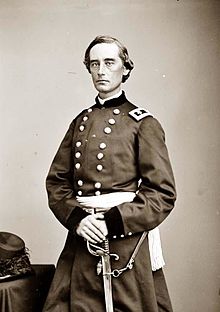Schuyler Hamilton
| Schuyler Hamilton | |
|---|---|

General Schuyler Hamilton
|
|
| Personal details | |
| Born |
July 22, 1822 New York City, New York, U.S. |
| Died | March 18, 1903 (aged 80) Manhattan, New York, U.S. |
| Resting place | Green-Wood Cemetery, Brooklyn |
| Spouse(s) |
Cornelia Ray (m. 1850; her death 1867) Louisa Francis Paine Allen (m. 1886; her death 1898) |
| Relations |
Alexander Hamilton (paternal grandfather) Elizabeth Schuyler (paternal grandmother) |
| Children |
Robert Ray Hamilton Schuyler Hamilton, Jr. |
| Parents |
John Church Hamilton Charlotte Augusta Apthorp |
| Military service | |
| Allegiance | United States of America |
| Service/branch |
United States Army Union Army |
| Years of service | 1841–1854 1861–1863 |
| Rank |
|
| Battles/wars | |
Mexican-American War
American Civil War
Schuyler Hamilton (July 22, 1822 – March 18, 1903) was an American soldier, farmer, engineer, and a grandson of Alexander Hamilton.
Hamilton was born on July 22, 1822 in New York City. He was the third of ten children born to John Church Hamilton (1792–1882) and Maria Eliza van den Heuvel. His paternal grandparents were Alexander Hamilton (1755/7–1804), a Founding Father of the United States, and Elizabeth Schuyler (1757–1854). His maternal grandfather was Baron John Cornelius van den Heuvel, the one-time governor of Dutch Guiana. Through his sister, Elizabeth Hamilton (1831–1884), he was the brother-in-law of Gen. Henry Halleck, and after his death, of Gen. George Washington Cullum. Hamilton attended and graduated from West Point in 1841.
Hamilton served with great gallantry in the Mexican War, and was brevetted first lieutenant in 1846 and captain in 1847. From 1847 until 1854, he was aide-de-camp to Lieutenant General Winfield Scott. In 1854, he wrote A History of our National Flag and on May 31, 1855, he resigned from the Army. During the War, he was wounded twice, once by a ball in the stomach and once by a lance which went completely through his chest, piercing his lung. Hamilton became an original member of the Aztec Club of 1847.
After the Mexican War, he went to California and became the administrator of the New Almaden quicksilver mine in Santa Clara County. After three years, he returned to the East coast and became a farmer in Branford, Connecticut.
...
Wikipedia
